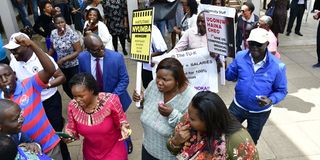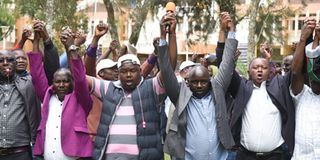Premium
Learning at public varsities paralysed as lecturers begin nationwide strike
The Universities Academic Staff Union (Uasu) and the Kenya Universities Staff Union (Kusu) have announced the start of a job boycott in Kenya’s 35 public universities.
The leaders of the two unions on Wednesday expressed their frustrations over delays in negotiating their members’ 2021-2025 Collective Bargaining Agreement (CBA) with the government.
Speaking during the launch of the strike at the Technical University of Kenya in Nairobi, Uasu and Kusu leaders decried low pay, delayed pay, non-remittance of statutory deduction and failure by the government to implement a comprehensive medical cover.
"We refuse to accept further delays in our compensation. We are ready for talks, but we will not return to work until a deal is reached. They either sign the 2021-2025 CBA or it will be the end of the world," said Uasu Secretary-General Constantine Wasonga.

Technical University of Kenya lecturers under the Universities Academic Staff Union (Uasu) kick off their strike on September 18, 2024.
"We came to the table to negotiate this CBA but the response was disheartening: ‘There’s no money’ yet, we see funds being mismanaged and squandered as Kenyans face crippling taxes. This is unacceptable”.
“If there’s truly no money, we are left with no choice but to strike until a fair deal is reached. We are vital stakeholders in this broad-based government, and our voices must be heard. We demand accountability and equitable treatment for all, we are going to strike," said Kusu Secretary-General Charles Mukhwaya.
The unions have expressed concern over the government's comparison of university staff to civil servants and vowed to halt fee collection until their pending salaries are paid.
Dr Wasonga said professors should not be equated with lower-grade civil service employees as he pointed out discrepancies in pay and promotion criteria as drawn by the Salaries and Remuneration Commission (SRC).
“The SRC cannot equate university staff with civil service employees. Our roles and responsibilities are vastly different. Universities are classified as state corporations, and they've been categorised accordingly. There are significant discrepancies in pay and promotion criteria that need to be addressed,” he said.
“We cannot be treated as civil servants. Vice chancellors, for instance, are mapped to state corporation category B, while other university workers fall under civil service. You cannot compare a professor to a civil service Group S employee.”
Mr Mukwaya called for the harmonisation of allowances for university staff and comprehensive medical coverage.
"Our proposals have been on the table since 2020, but we have not received adequate responses. We have issued a strike notice, and I assure you that we will continue our strike until our demands are met," he said.

University Academy Staff Union''s Secretary General for University Eldoret Chapter Philip Chebunet second (right), the Kenya University Staff Union at the institution's Secretary General Robinson Korir second (left), officials and members of the unions, during the launch of the nationwide strike over their Collection Bargaining Agreement on September 18, 2024, after talks with the government failed.
He emphasised that ongoing negotiations must yield results, warning that failure to resolve these issues by 2024 indicates a lack of commitment from the government.
Mr Mukwaya pointed out that while the government claims there is no money for staff salaries, funds appear to be misallocated.
The strike has raised alarms about the potential disruption to academic activities across public universities, with union leaders urging university management to take their concerns seriously.
"There will be no learning in any public university or colleges, because we are going to strike like no man's business. I want to express my gratitude for all the support we've received," said Dr Wasonga.
“However, I must highlight our ongoing frustrations with delayed salary payments, unmet remittances, and our collapsed pension schemes. We have been taken for granted for too long, and we are determined to strike until we reach a satisfactory agreement.”





